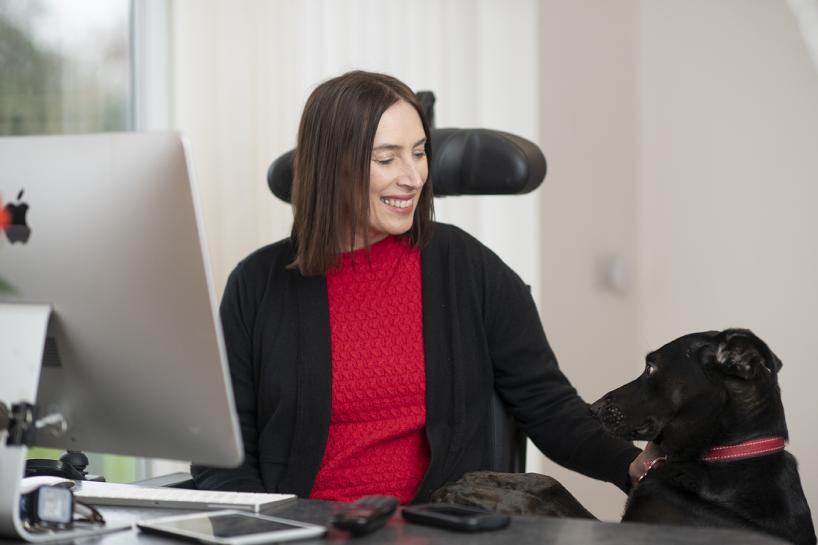
Liz chairs the FSH Support Group, which we support, and helps us develop information and resources to increase understanding of FSHD and wider issues affecting all people with muscle-wasting conditions. She is also one of our peer support volunteers. Liz tells us why she decided to get so involved.
“When I was first diagnosed with FSH muscular dystrophy back in 2004 I knew it was a reasonably rare condition in that I was unlikely to meet anyone else with the condition in my everyday life."
I really wanted to find someone like me and the internet was my first port of call.”
I was lucky to find a couple of forums created by others with the condition who wanted the same thing; to connect and share their experiences. Here I found my tribe.
“From this group I first heard about Muscular Dystrophy UK. MDUK in 2012 engaged with the FSH-MD online community to create one of their first Information Days. I remember over 100 people with the condition attended at that time.
“This was a huge success and there have been many information days since. I met so many people that day who I am still in contact with even now who represented the broad spectrum of how FSH can affect someone with the condition. I know that those who might be at the start of their journey can feel they don’t want to see others who are perhaps further down the road of progression. But the majority of those reluctant to attend came away feeling it was a positive experience.
“I became more and more involved with MDUK and eventually, when the peer support scheme started, I jumped at the chance to volunteer.”
“Whether it was planning my future, moving home, house adaptions, eventually using a wheelchair or even planning a holiday and where to go for those facing mobility challenges, I gained some knowledge from everyone I met.
“Since then, I have been supported by and provided support to an amazing army of individuals.”
“The work varies so much from helping research, suggesting holidays, and even supporting people to go on and have a family. If that’s not life changing I don’t know what is.
“MDUK also provide Muscle Group meetings. I attend the Milton Keynes Muscle Group, which regularly welcomes 20 people with various forms of muscular dystrophy. It is such a positive group of people and we share our muscular dystrophy journey as well as find out about local services and how to access them. Without these amazing people I would have taken a lot longer to make the transition from walking to using a wheelchair full-time.
“They supported me when I needed to change my vehicle to a Wheelchair Accessible Van, with experience of what was possible and how to avoid pitfalls and delays. You regularly see Muscle Group attendees in the car park afterwards discussing their vehicles, lifts and hoists, wheelchairs, scooters etc.
“Being involved helps MDUK evolve to best support those with muscle-wasting conditions, whether it’s campaigning, providing new vital information for the newly diagnosed, helping families with children, supporting people with work issues or benefit entitlement, or what research to focus on.
Because I have learned so much over the last 15 years, I feel it is only right to pass on what I know.
“There isn’t a text book for navigating FSH or any muscle-wasting condition for that matter. Everyone is an individual with different priorities and outlook. I try to assess what sort of support someone needs right now, arrange to give support in a way they are comfortable with, sometimes reassure about what the future holds. I say they can ask anything at any time when they are ready, there is no set rulebook, and I suggest, signpost, not enforce my opinion and offer support without prejudice.
“Engaging with peer support [for MDUK], is not entirely selfless; not only have I maintained a level of independence I am happy with through the knowledge I have gained through others, I have a ping from happy endorphins every time I feel I have helped someone in some way. It’s great for my mental health and has only ever been positive for me. If you have a couple of hours a week to spare, consider volunteering for peer support. I know how peer support can change lives – I’ve seen it first-hand.”
You can find out more about MDUK peer support volunteers.
